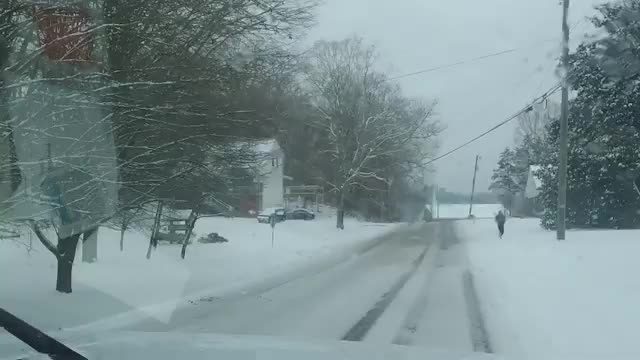Walker County crews report passable but treacherous roads, warn of salt shortfall and escort ambulance up Lookout Mountain
Get AI-powered insights, summaries, and transcripts
Subscribe
Summary
Walker County public works crews drove county roads during a freezing-rain/sleet event on Jan. 10, reporting passable but slippery conditions on Lookout Mountain and in Lafayette, escorting an ambulance to a private drive and warning the county is low on pure salt for small trucks.
Walker County public works crews spent the afternoon and evening of Jan. 10 driving county roads, checking access for emergency responders and working to clear slush and compacted snow after a changeover to freezing rain and sleet.
The trip was livestreamed by county staff as crews ran plow and support trucks across Lookout Mountain, Nickajack Road, Lula Lake Road and into Lafayette. Crews said many state routes had received material from the Georgia Department of Transportation but secondary and mountain roads remained slushy and could freeze overnight.
The county’s road supervisor, Carlin Bowers, told the livestream that crews have been operating long shifts and working to “get as much moisture off of it as possible so it doesn't freeze back up tonight.” He described Nickajack Road as “passable” if drivers “take their time” and explicitly advised against travel on some mountain roads: “I wouldn't advise anyone to travel on Lula Lake Road right now.”
Why it matters: county crews said immediate concerns were ensuring ambulances could reach private drives on steep mountain roads, keeping main corridors passable and conserving limited salt supplies. County staff escorted an ambulance to a private drive off State Route 157 to confirm the vehicle could reach the patient, then monitored the return route to Lafayette.
Most important facts
- Road conditions: Crews reported widespread slush, compacted snow in tire lanes and sections that could freeze as temperatures drop. They marked sections of Nickajack, Lula Lake Road, Mission Ridge and other Lookout Mountain routes as especially prone to overnight icing.
- Emergency access: The livestream team said they were checking whether an ambulance could reach a private drive off State Route 157; county vehicles accompanied the ambulance and stood by to assist if it slid or needed winching.
- Crews and staffing: Public works crews have been in the field since about 4 a.m., operating in 12-hour shifts (4 a.m.–4 p.m. and 4 p.m.–4 a.m.). Bowers said crews would continue through the night and that supervisors planned to reassess operations at midnight.
- Salt and material usage: County staff reported heavy usage of deicing materials. On camera, a staff member estimated about 8–9 pallets of pure salt used in smaller trucks and roughly “5200 tons” of material used in larger trucks during the event; staff characterized these figures as high and said they were near the bottom of their spare supply for the small trucks.
- Coordination with GDOT and public alerts: Crews observed Georgia Department of Transportation (GDOT) plows on state routes, noted GDOT material when visible and said the county would post updates via the Emergency Operations Center (EOC) channels, Facebook, the Siren GPS system and the Neighbors app.
Quotes from staff and officials
"We're just trying to get all the slush cut off the road, trying to get caught up on a lot of the secondary roads," Carlin Bowers said while driving a county truck. "I wouldn't advise anyone to travel on Lula Lake Road right now."
Joe McGee, identified on the livestream as the county’s company relations director, appeared briefly on camera; county staff also took a call from Commissioner Hart, who checked on crews' safety and restocking plans.
Additional details and context
- Equipment and technique: Crews said they were focusing on blading slush off roads rather than laying more material in areas where temperatures were expected to fall, to reduce the risk of refreezing overnight. In several places they described waiting for material to “work” before re-blading.
- Livestream and communications: County staff acknowledged several cellular dead zones on Lookout Mountain that intermittently cut the livestream and made remote situational updates more difficult. Staff asked viewers to check county social channels and the Neighbors app for updates.
- Local advice: Multiple times on the live feed, staff urged residents to avoid travel if possible and to allow emergency and public-works vehicles room to operate. County staff said they planned to continue operations through the night and to re-evaluate at midnight, and they encouraged residents to watch official channels for updates.
Ending
Walker County public works described a countywide winter response that relied on plowing, blading and targeted material application while conserving dwindling supplies of pure salt for small trucks. Crews emphasized the risk of refreeze overnight and said they would continue clearing and monitoring routes, prioritizing ambulance access and major county corridors. The county directed residents to its Facebook page, the Siren GPS notifications and the Neighbors app for official, real-time updates.
